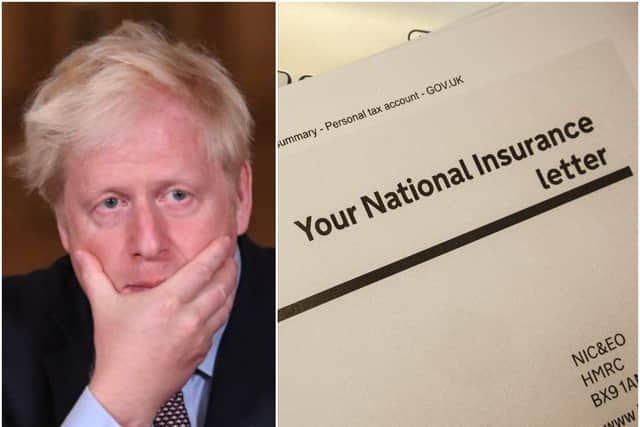National Insurance rise: When does the new tax rise start, does it affect Scotland, how much will it cost me?
and live on Freeview channel 276
Prime Minister Boris Johnson and Chancellor Rishi Sunak said the £12 billion rise “must go ahead”, despite it being criticised from MPs from all parties.
In 2022, National Insurance will go up to support the NHS and equivalent bodies across the UK as they deal with the backlog caused by Covid-19. In 2023, the rates will decrease back to current levels and a new Health and Social Care Levy will be introduced to help health and social care bodies.
Why is it controversial?
Advertisement
Hide AdAdvertisement
Hide AdThe planned rise comes at a time when food and energy prices are rocketing, and inflation has reached 5.4 per cent.


Critics of the scheme argue that it will have a bigger impact on lower-earning workers - which is not something they need when the cost of living is also rising.
This is because those employees pay 12 per cent on income up to £50,268, and just 2 per cent on income over that.
Conservative MPs have also called for the rise to be delayed.
How much will it cost me?
Advertisement
Hide AdAdvertisement
Hide AdEmployees, employers and the self-employed will pay 1.25p more in the pound for National Insurance - and then the Health and Social Care Levy when that starts in 2023. This will be on top of the existing payments.
At the moment, employees pay National Insurance on their wages, employers pay contributions for their staff, and the self-employed pay it on their profits. It is used to fund the NHS, benefits and the state pension.
Those earning under £9568 a year will not have to pay National Insurance or the new levy. Those above state pension age will not have to pay the National Insurance rise, but will have to pay the levy.
£20,000 per year - £130 tax rise
£30,000 per year - £255 tax rise
£50,000 per year - £505 tax rise
£80,000 per year - £880 tax rise
£100,000 per year - £1130 tax rise
Does it affect Scotland?
National Insurance is not a devolved matter and is a tax reserved to the UK Government. The Health and Social Care Levy will also fall under the National Insurance bracket - meaning it is also not in the hands of Holyrood.
Advertisement
Hide AdAdvertisement
Hide AdOf the £12 billion raise through the scheme, around £1.1 billion will go to Scotland, according to the PM.
However, unlike other funding given from Westminster to Holyrood, this will be ring-fenced and must be spent on health and social care.
The rise in National Insurance contributions starts on April 6, 2022. The Health and Social Care Levy will take-over on April 6, 2023.
Comment Guidelines
National World encourages reader discussion on our stories. User feedback, insights and back-and-forth exchanges add a rich layer of context to reporting. Please review our Community Guidelines before commenting.
